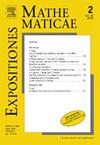解析三角多项式的希尔伯特零矩阵
IF 0.8
4区 数学
Q2 MATHEMATICS
引用次数: 0
摘要
本文证明了解析多项式的一个新的Hilbert Nullstellensatz,即如果{fj}j=1n≥2是在有限复平面上没有公零的解析三角多项式,则存在{gj}j=1n≥2服从∑j=1n≥2fjgj=1的解析三角多项式,从而不仅强化了整个函数的Helmer主理想定理,而且找到了解析多项式的Hilbert Nullstellensatz到π上毕达哥拉恒等式的内在路径。本文章由计算机程序翻译,如有差异,请以英文原文为准。
Hilbert’s Nullstellensatz for analytic trigonometric polynomials
This paper proves such a new Hilbert’s Nullstellensatz for analytic trigonometric polynomials that if are analytic trigonometric polynomials without common zero in the finite complex plane then there are analytic trigonometric polynomials obeying in , thereby not only strengthening Helmer’s Principal Ideal Theorem for entire functions, but also finding an intrinsic path from Hilbert’s Nullstellensatz for analytic polynomials to Pythagoras’ Identity on .
求助全文
通过发布文献求助,成功后即可免费获取论文全文。
去求助
来源期刊
CiteScore
1.30
自引率
0.00%
发文量
41
审稿时长
40 days
期刊介绍:
Our aim is to publish papers of interest to a wide mathematical audience. Our main interest is in expository articles that make high-level research results more widely accessible. In general, material submitted should be at least at the graduate level.Main articles must be written in such a way that a graduate-level research student interested in the topic of the paper can read them profitably. When the topic is quite specialized, or the main focus is a narrow research result, the paper is probably not appropriate for this journal. Most original research articles are not suitable for this journal, unless they have particularly broad appeal.Mathematical notes can be more focused than main articles. These should not simply be short research articles, but should address a mathematical question with reasonably broad appeal. Elementary solutions of elementary problems are typically not appropriate. Neither are overly technical papers, which should best be submitted to a specialized research journal.Clarity of exposition, accuracy of details and the relevance and interest of the subject matter will be the decisive factors in our acceptance of an article for publication. Submitted papers are subject to a quick overview before entering into a more detailed review process. All published papers have been refereed.

 求助内容:
求助内容: 应助结果提醒方式:
应助结果提醒方式:


